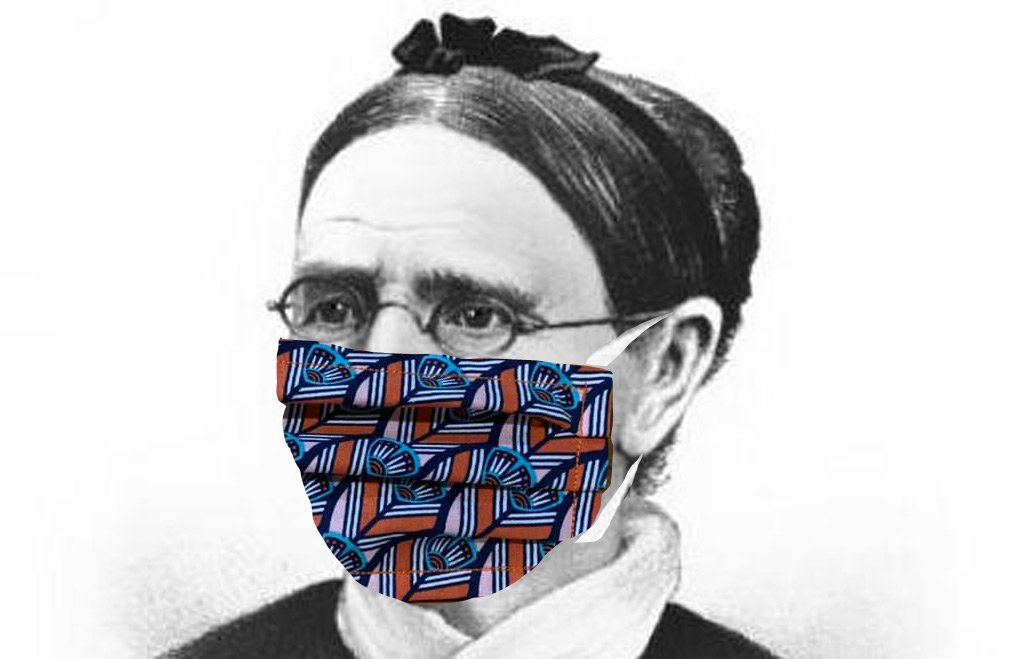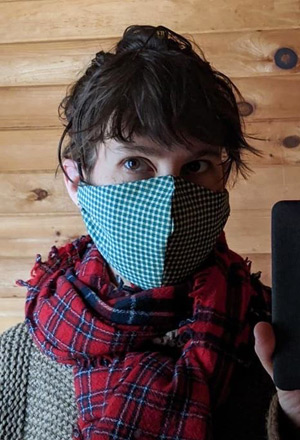
Stan Plum, curator of the Carnegie Museum in Fairfield shared an inspiring post on the museum’s Facebook page:
“Mehitable Owens Fox Ellis Woods heard the call for blankets, quilts, and bandages in 1861 badly needed by the Fairfield men fighting in the Civil War. She helped to organize the women of Fairfield to answer the call by sewing the needed items and arranging for their transportation. In 1862 when shipments began piling up in Keokuk, Mrs. Woods personally drove a team of horses with wagons full of the needed supplies to the Fairfield troops on the front line. She made 13 trips across the South on a pass from the Secretary of War facing down incredulous military officers and enemy bullets. She earned the rank of Major for her brave efforts.
“The spirit of Mehitable lives on in the Sewing Masks – The war effort, a group of Fairfield women sewing face masks for local healthcare workers and first responders.
“HATS OFF TO THE WOMEN OF FAIRFIELD! They will git ’er done!” Stan wrote.

Sewing Masks – The War Effort Facebook page is a community page spearheaded by Lisa Mack Cohen in collaboration with dozens of local crafters. The page, which is open to all (search for the page and click “join”), is intended for the sharing of ideas, materials, CDC approved patterns, updates about community needs, and the coordination of mask collection and delivery.

If you’d like to help make cotton face masks, here are the very basics.
- All fabrics need to be pre-shrunk. Before cutting, machine wash and dry fabrics using the hottest settings. (The JCHC will sterilize all masks in boiling water before use.)
- 100% cotton fabric is recommended for the outside of the mask, and 100% cotton flannel for the inside. The higher the thread count the better.
- 1/4 inch or 3/8 inch elastic is recommended.
- Here’s a the link to one pattern (and tutorial video) approved by the Jefferson County Health Center, and meeting the basic requirements by the CDC for emergency situations. UPDATE! Here’s a link to a secondary, slightly preferred pattern (it fits the face better), but don’t worry, ALL masks are greatly appreciated: Olson Mask. Note! If you are using the Olson pattern, please do include the hair elastics yourself.

Olson Mask made and modeled by Torrey Witherspoon - If you need someone to pick up your finished masks, contact Linda Marlay, Lisa Cohen, or Pam Corrick through the Sewing Masks group. (Also see Lisa and Pam’s contact info below.)
- If you prefer to drop them off, leave them at 1005 Grand Park Dr., Fairfield, by the front door. A volunteer will bring them to the hospital.
- If you are in need of materials, look through the posts on the Sewing Masks – The war effort Facebook page and connect with someone who has what you need. Or post your needs and see if anyone can help. If you have materials, sewing machines, or wish to help in any other way, your contributions are most welcome.
If you’re in the Fairfield area and have further questions, contact Lisa Mack Cohen through Facebook or email her at lisakaycohen@gmail.com, or Pam Corrick (641) 919-0133, pammycakes88@gmail.com, and they will do their best to help you. A few community members have also offered to help pay for materials should someone need a hand.

“I just read that New York City is so short of face masks right now that people are wearing garbage bags,” Pam says. “I can make a mask in about 7-1/2 minutes.”
Wearing a homemade mask—or even a bandana—is also a great way to train yourself to stop touching your face, the number one cause of getting Covid-19. Now go wash your hands!
You can also help hospitals and other facilities across the country through the #millionmaskchallenge.

